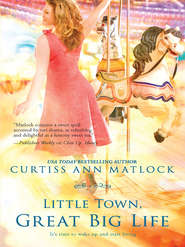скачать книгу бесплатно
What flew after her was him hollering, “Bring me back a six-pack of—”
The back door closed, and she raced away to her car, hopping over the puddles.
As she backed out, a car pulled up in front. One of her granddaddy’s drinking buddies. The tightness in her throat grew so great she had to gasp for breath.
She pulled into the Quick Stop for five dollars’ worth of gas and ended up helping LuAnn wait on a flood of customers driven in there by the rain. Everyone was talking about it, and depending on circumstances and temperaments, people moaned about the dreariness and inconvenience, or gave happy praise for coming green lawns and May flowers.
Over at the First Methodist Church, a few of the smokers, who usually had a quick cigarette on the front lawn before service, snatched a couple of puffs in the shelter of a large cedar tree. From here they watched the men with umbrellas, who ran to meet those arriving and hold cover over the women and girls.
Jaydee Mayhall, feeling guilty, stamped out his butt, and hurried to get the umbrella out of his own car and help. He began right then planning to put up an awning over the church walkway.
Parking was directed by men in slickers and ball caps. There was an unusually large crowd—many who only came on Easter and Christmas, as well as Baptists and Assemblies of God and the Good Shepherds from out on the highway who loved to sing, and a couple of brave Episcopalians. Vehicles filled the church parking lot, the grassy yard where the church played baseball and up and down both sides of the street.
Bobby Goode, who lived just south of the church, had the idea to make some money by charging three bucks a car to park in his circle driveway and spacious front yard. His wife’s response to this idea was to have a fit and tell him that if she saw one rut on her front lawn, his funeral would be the next event at the Methodist Church. She said that he could let people park in the driveway—for free.
She said nothing about not taking what people offered, though, so when Rick Garcia parked his big-wheel mud truck in Bobby’s driveway and waved a five at him, Bobby took it quick, and directly after the truck, Bobby waved in two little foreign jobs that he got parked bumper to bumper. He held out his hand and received eight more dollars.
Across the street, Inez Cooper punched off her radio right in the middle of “Wait for the Light to Shine.”
“If we wait for the light, we’ll miss the singin’,” she said to the radio. The cloud cover had kept it so dark that at nine-thirty in the morning the streetlights still glowed.
She called for her husband, Norman, to hurry up. Unfortunately, she immediately caught the scent of cigarette smoke on him. “I cannot believe you. Go wash your hands, at least, so’s maybe not everybody will smell it. And hurry up. You’re gonna make us late.”
Norman did as he was told, while Inez put on rain boots and carefully color-matched a green umbrella to her suit. When he reappeared, she stepped onto the porch, opened the umbrella and was halfway down the walkway when she realized that Norman was lagging behind, like he always did. She hated that, and of course it was because smoking cigarettes was cutting down his wind, which she told him. He did not answer, nor did he speed his steps. She had to pause again at the curb and wait for him. “Would you get under this umbrella? You are gettin’ all wet…you’re gonna catch your death.”
At that moment, Juice Tinsley’s car stopped. The car window on the passenger side came down, and Julia called out, “Can we park in your driveway, Inez?”
“Well, no…no, that’s not a good idea.”
“Why not?”
“It’s just not. I don’t want people parkin’ up and down my drive—we may need to get out later. Come on, Norman.”
Bobby Goode popped out into the street and directed Juice into his driveway. He said, “I’m takin’ donations for parkin’.”
Juice pulled a couple of dollars out of his pants pocket, then hurried after Julia, who had removed her shoes and was already halfway across the churchyard, running barefoot with her Bible held over her head. Juice idly wondered if maybe rain would not hit the Bible, a holy book. His gaze slid over to Norman Cooper.
The men’s eyes met for a second of understanding neither could ever put into words, and then each looked straight ahead, heading for the church steps. Iris MacCoy was just going up, and Norman hurried to walk beside her.
Woody Beauchamp’s old black Plymouth came slowly down the street. It was so old that it had the great rear fender fins, and so well cared-for that the rain made tiny beads on the shiny finish. Seeing two cars pulling into a curved driveway, Woody followed. At first he wondered if he had made a mistake, but he recognized a couple of his customers from the café getting out of the cars ahead. Then Bobby Goode was there, waving him up a couple more inches. “Bring her on out of the street.”
As Woody got himself out from behind the wheel, Bobby had his hand out. Woody shook it and said, “Thank you, brother.”
Andy Smith got out of the passenger side and, in his lanky walk, came around the front of the Plymouth. Woody wore a good felt hat, but Andy’s head was bare.
“You got to get you a hat, boy,” said Woody.
Вы ознакомились с фрагментом книги.
Для бесплатного чтения открыта только часть текста.
Приобретайте полный текст книги у нашего партнера:
